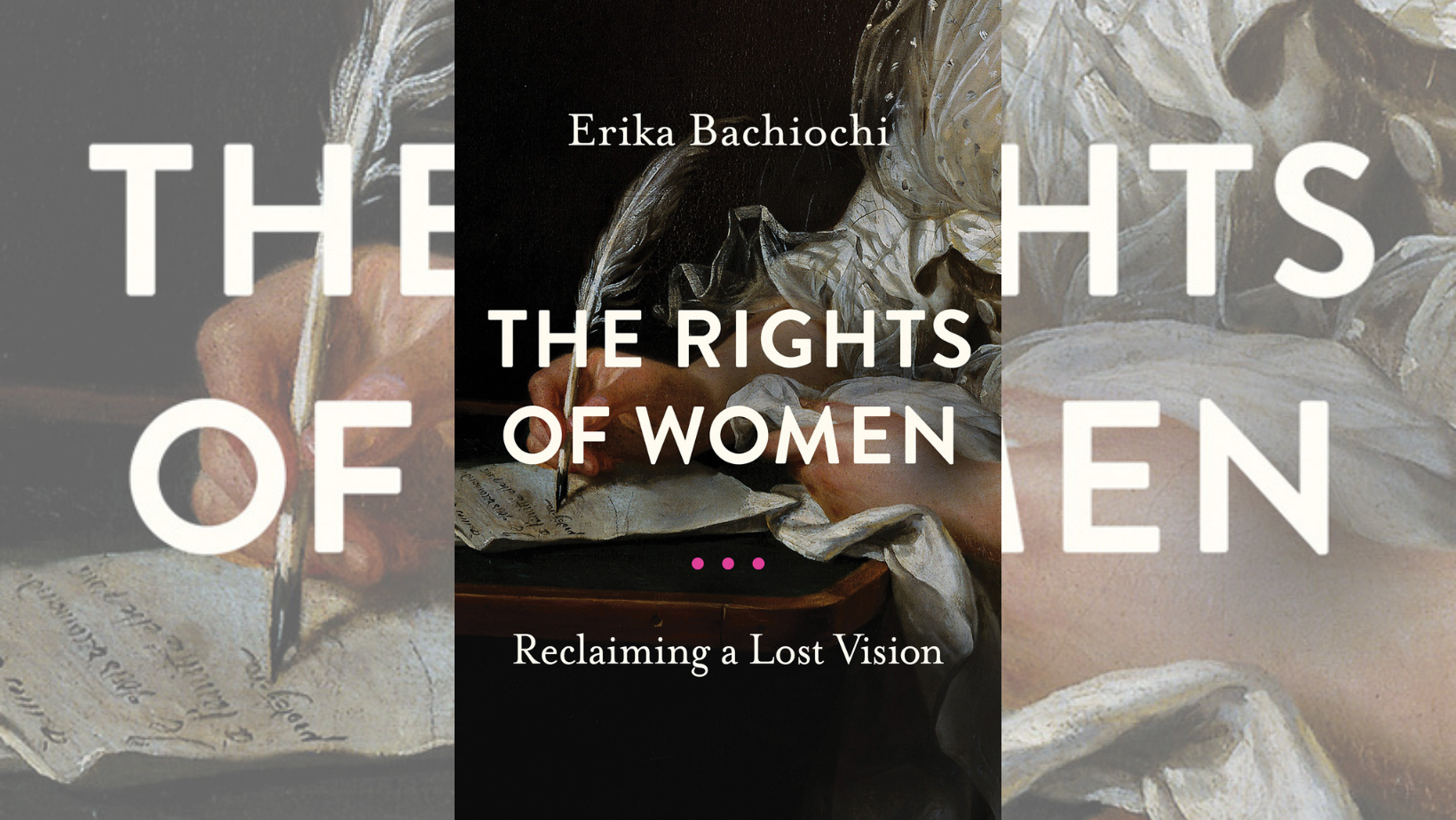
Reviewing Erika Bachiachi’s The Rights of Women: Reclaiming a Lost Vision
By: Nadia Hartwig
In the current political climate, where being a “feminist” usually encompasses pro-abortion rallies, anti-marriage stances, and hostile views toward traditional gender roles beneath shouts for gender equality, it is hard to figure out what to think about feminism as a for-life, Christian woman. I often find myself wanting to slide as far away as possible and loudly declare that I am actually an anti-feminist! Yet, femininity and support of those who are female, at its core, isn’t bad. After all, didn’t God create men and women as equally valuable gifts to the world? Isn’t it wrong for single mothers to be taken advantage of in the workforce? Indeed, there is no doubt that women are at a disadvantage in their careers if they take time off to start a family.
Is there a place for those of us who wish to affirm the foundational feminist truth that all people have equal value in God’s eyes and that women’s contributions to the world should be cherished without, at the same time, synonymously supporting the taking of innocent lives, degradation of men, belittling of family, and promiscuity prescribed as the social fix to sexism?
Author Erika Bachiochi believes this is possible. In her book, The Rights of Women, Bachiochi advocates for reclaiming and reapplying the lost vision of original feminism that Mary Wollstonecraft, an English philosopher, promoted in the 18th century.
Although she eventually fell away from Christianity, Mary Wollstonecraft was the herald of a vision of feminism encompassing many views of gender, marriage, and sexuality that are consistent with a Biblical worldview and echoed by Erika Bachiochi today. According to these two women, feminism should be grounded in two main ideals: seeking virtue and the value of domestic life. While God created men and women with numerous differences, the importance of virtue is one thing they share. Work assigned to men and women respectively helps to develop virtue within them- virtue found in caring for the most vulnerable in society as Jesus cared for us. Thus, women should be caring for children, and men should be caring for women and children. Family, rather than materialism, should be at the center of society. This is where feminism comes into play.
Wollenstonecraft and Bachoiochi claim that for women to fulfill their God-given tasks in the home to the best of their abilities, they should have access to equal education to develop virtue within them. We recognize, as Christians, that women, fully equipped with the Gospel, have been given a special place in the family and in society for cultivating a life of virtue within their homes and communities. Women, just like men, are given minds and intellects to be used for God’s glory, minds that should be nourished and fed for the benefit of society.
In Wollstonecraft’s day, and mirrored in ours, there was a cultural epidemic of a lack of chastity, especially among men. With the prevalence of promiscuity and high rates of abandonment, women and children were hurt by the lack of a caring, nourishing, dependable father and provider.
The same is true today. There is a natural imbalance placed upon women when it comes to child-rearing that leaves them more vulnerable than men when a baby is conceived. This is not inherently negative, though. It is a great and beautiful privilege to nurture and care for a whole and tiny human life, a miracle from God in and outside the womb. In fact, it is such an important blessing that men are called to partake in it as well, but in different ways. They loyally care and provide for the mother and are called to be the spiritual leaders of their family. Both men and women with families are called first and foremost to domestic life as their most important duty as they mirror Christ’s love for His bride the church.
Bachiochi argues that this vision of feminism, one where the lives and value of women as intellectual creatures and the recognition of the ultimate importance of the vocation of caregiving, was overturned during the sexual revolution. At that point, the feminist platform in America slowly began to adopt abortion as empowering to women. By encouraging men and women to partake in “sexual freedom” at the expense of a child’s life, a woman’s God-given nurturing nature was exploited, and virtue and chastity were abandoned. Rather than celebrating the unique God-given differences between the sexes, encouraging women to live up to their fullest potential, truly empowering men and women to lead virtuous lives, and putting the domestic life at the center of society, the supposed self-satisfaction of the individual became the goal of the abortion industry. The same goal hijacked the feminist movement.
If we truly want to lift up the women in our lives, what should modern feminism strive for? Inherently classic ideals: A call for chastity, time off for expectant mothers and fathers without repercussions, education on virtuous living, and respect for the honorable vocation of caregiving. According to Wollstonecraft and Bachiochi, these ideals must once again become the rallying cry for feminism today.
But while Wollstonecraft and Bachiochi bring up many great points about feminism and provide us with a life-affirming view of the movement, there is a large hole in their picture, and that is a clearly articulated Gospel. They’re missing the “Why?” behind the feminist movement. Women and men are not simply valuable because of the roles they play in family and society. Rather, they are inherently valuable because they are created and redeemed by God Himself.
Feminism reaches for an ideal, one that may be laudable, but without God, it is ultimately impossible. We live in a broken, sinful world, and sin, including the devaluing of others, self, and vocation, will always be a reality that we must fight against. Yet, as we wait for Christ’s return, we have a message of hope to proclaim to women who have been hurt and abandoned by the abortion industry and a culture of sex. Christ died for and forgave the sins of all people, and we find true salvation in Him. He loves every one of His children and calls us to do the same. We lift up women and men because they are created in His image. Because of God’s work in our lives, we are able to be voices for our God’s life-affirming plan for men, women, children, and families.
